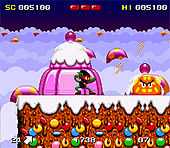Zool
| Zool: Ninja of the Nth Dimension | |
|---|---|
 Cover art used for the Amiga and DOS versions | |
| Developer(s) | Gremlin Graphics |
| Publisher(s) | Gremlin Graphics Commodore |
| Composer(s) | Patrick Phelan (CD32) Neil Biggin |
| Platform(s) | Arcade, Acorn Archimedes, Amiga, Atari ST, Amiga CD32, DOS, Game Boy, Sega Game Gear, Sega Master System, Sega Mega Drive/Genesis, SNES |
| Release date(s) | October 1992 |
| Genre(s) | Platformer |
| Mode(s) | Single player |
| Distribution | Floppy disks, CD-ROM, ROM cartridge |
Zool: Ninja of the Nth Dimension is a video game originally produced for the Amiga by Gremlin Graphics in 1992.
Zool was intended as a rival to Sega's Sonic the Hedgehog. It was heavily hyped upon its initial release, including being bundled with the newly launched Amiga 1200, although not the AGA version with enhanced graphics which followed later. In 2000 the game was re-released as part of The Best of Gremlin compilation.
Plot
Zool is a gremlin "Ninja of the Nth Dimension" who is forced to land on Earth. In order to gain ninja ranking he has to pass seven lands.
Gameplay

The game is a pure platform game, relying on smooth, fast moving gameplay, colorful graphics and a soundtrack by Patrick Phelan which overlaps with the Lotus 3 soundtrack and inspired several modern electro/techno remixes. The game also contains a number of embedded minigames, including several arcade games, a scrolling space shooter and a game accessible only by making Zool play a certain tune on an in-game piano or finding certain invisible warp points.
Development
George Allen came with the idea of Zool as he was criticized on his previous game Switchblade II for having a lack of enemies. In development, Zool could cast spells to get him out of trouble by collecting potions. For example, Zool could escape from pits with high jump spells and cast a shadow spell to make a clone of him that follows his actions (thus doubling the fire power). In the final version, the spells were replaced with collectible powerups. The very early name for the project was Pootz.[1] Many reviewers assumed that Zool was an ant, although this was refuted in a press release.
Zool was also ported to the Atari ST, Game Boy, Sega Mega Drive, SNES, Master System, Sega Game Gear, Amiga CD32, PC, Acorn Archimedes, and RISC OS platform, as well as for the arcade machines.[2]
The Amiga CD32 version has original red book audio tracks by Neil Biggin and has the option to have both sound effects and music. This and the Acorn Archimedes port are the only two incarnations of the original Amiga version to have this.
Most Computer ports are close to the Amiga original but the Mega Drive and Super Nintendo port are very different with different levels which are smaller likely due to shortage of RAM, different graphics and bosses. The SNES port is very buggy with a low horizontal resolution, which makes it easier to run into enemies and being overall a slower game.
Reception
The original Amiga game was released to critical acclaim,[3] receiving such scores of 97%, 96%, 95% from Amiga Computing, Amiga Action and Amiga Format respectively.
The reworked console versions by EA and GameTek were less positively received.
Electronic Gaming Monthly rated the Genesis version a 5.8 out of 10, commenting that "Zool sports great graphics, but ends up with a case of Super Trolland's disease: your character moves much too fast and with little control!"[4]
GamePro gave a positive review of the Game Gear version, commenting that "Great graphics and sound abound, and the game play is crisp, requiring careful navigating to avoid the bothersome foes and hazards."[5]
Virgin Media included Zool on the list of top ten video game ninja heroes.[6] In 2011, Wirtualna Polska ranked it as the 22nd best Amiga game, noting its "absurdly" high difficulty.[7]
Sequel
Books
Two young adult novels book based on the games, entitled Cool Zool and Zool Rules, were released in February 1995. They were written by Stan Nicholls and Ian Edginton and published by Boxtree.[8]
The Game Maker's Companion (APress, 2010), a book on hobbyist game development, contains step-by-step instructions on how to re-make the original Zool game using GameMaker: Studio.[9]
References
- ↑ http://amr.abime.net/review_28495
- ↑ A picture of the little-known Zool coin-op
- ↑ http://amr.abime.net/amr_search.php?search=zool&mag_id=0&action=Find
- ↑ "Review Crew: Zool". Electronic Gaming Monthly (54) (EGM Media, LLC). January 1994. p. 46.
- ↑ "Zool". GamePro (58) (IDG). May 1994. p. 130.
- ↑ Zool (Zool) – Top ten ninjas – Pictures – Games – Virgin Media
- ↑ 22. Zool – 30 najlepszych gier na Amigę – Imperium gier, WP.PL (Polish)
- ↑ Stan Nicholls
- ↑ The Game Maker's Companion
External links
- Zool at MobyGames
- Zool: Ninja Of The Nth Dimension Amiga – HOL database
- Zool can be played for free in the browser at the Internet Archive